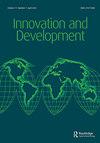Eco-innovation and agricultural sustainability: empirical evidence from South Africa’s agricultural sector
IF 1.7
Q3 DEVELOPMENT STUDIES
引用次数: 0
Abstract
ABSTRACTThis study explores the role of eco-innovation in promoting environmental sustainability in the agricultural sector in South Africa. The study applies a mixed-methods approach using both qualitative and quantitative data on eco-innovations. The study is guided by the Resource-Based View (RBV) as a theoretical lens and applies a logistic regression model to explore the relationship between various resources and capabilities and four types of environmental sustainability outcomes. The results suggest that agricultural businesses that invest in developing process innovations, acquire knowledge from external sources, leverage different types of technologies such as precision agriculture and sensor technologies are more likely to achieve improved environmental sustainability outcomes. The study suggests a few policy recommendations that emphasize the importance of creating incentives for agricultural businesses to invest in innovative and sustainable agricultural practices, collaborate with higher education and government research institutions and facilitate adoption of advanced ICTs to promote eco-innovation.KEYWORDS: Eco-innovationResource-based viewAgricultural sustainabilitySouth AfricaEnvironmental impact Disclosure statementNo potential conflict of interest was reported by the author(s).Additional informationFundingThis work was supported by the Department of Science and Innovation, South Africa.生态创新和农业可持续性:来自南非农业部门的经验证据
摘要本研究探讨了生态创新在促进南非农业部门环境可持续性方面的作用。本研究采用混合方法,同时使用生态创新的定性和定量数据。本研究以资源基础观(Resource-Based View, RBV)为理论视角,运用logistic回归模型探讨了各类资源和能力与四类环境可持续性结果之间的关系。研究结果表明,投资开发流程创新、从外部资源获取知识、利用不同类型的技术(如精准农业和传感器技术)的农业企业更有可能实现更好的环境可持续性成果。该研究提出了一些政策建议,强调了为农业企业投资创新和可持续农业实践、与高等教育和政府研究机构合作以及促进采用先进信息通信技术以促进生态创新的重要性。关键词:生态创新;资源基础观;农业可持续性;南非;环境影响披露声明;这项工作得到了南非科学与创新部的支持。
本文章由计算机程序翻译,如有差异,请以英文原文为准。
求助全文
约1分钟内获得全文
求助全文
来源期刊

Innovation and Development
Social Sciences-Cultural Studies
CiteScore
3.70
自引率
0.00%
发文量
24
期刊介绍:
conomic development and growth depend as much on social innovations as on technological advances. However, the discourse has often been confined to technological innovations in the industrial sector, with insufficient attention being paid to institutional and organisational change and to the informal sector which in some countries in the South plays a significant role. Innovation and Development is an interdisciplinary journal that adopts a broad approach to the study of innovation, in all sectors of the economy and sections of society, furthering understanding of the multidimensional process of innovation and development. It provides a forum for the discussion of issues pertaining to innovation, development and their interaction, both in the developed and developing world, with the aim of encouraging sustainable and inclusive growth. The journal encourages articles that approach the problem broadly in line with innovation system perspective focusing on the evolutionary and institutional structure of innovation and development. This focus cuts across the disciplines of Economics, Sociology, Political Science, Science and Technology Policy, Geography and Development Practice. In a section entitled Innovation in Practice, the journal includes short reports on innovative experiments with proven development impact with a view to encouraging scholars to undertake systematic inquiries on such experiments. Brief abstracts of degree awarded PhD theses in the broad area of concern for the journal and brief notes which highlight innovative ways of using internet resources and new databases or software are also published.
 求助内容:
求助内容: 应助结果提醒方式:
应助结果提醒方式:


